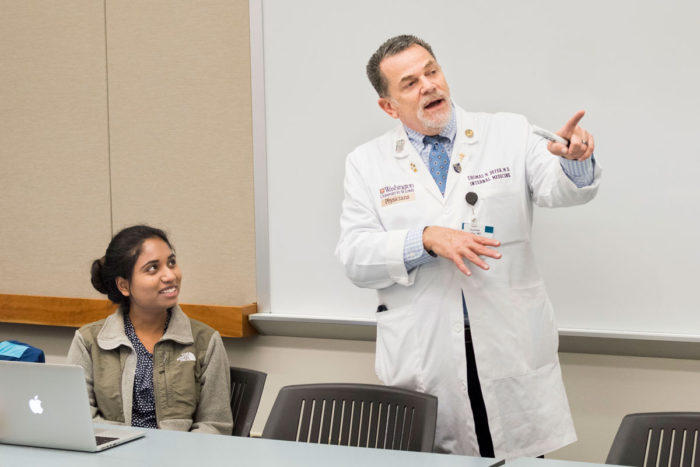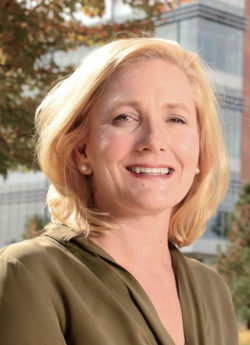Medical school to review, revise curriculum
De Fer to lead efforts as associate dean for medical student education
 Matt Miller
Matt MillerThomas M. De Fer, MD, a professor of medicine at Washington University School of Medicine in St. Louis, teaches a practice of medicine class in November at the Farrell Learning and Teaching Center while student Mounica Paturu listens. De Fer has been named associate dean for medical student education and will play a key role in leading curriculum renewal efforts.
Washington University School of Medicine plans to review and revise the medical education curriculum to reflect the fast-moving changes in the health-care industry while also broadening the skills of students in health technology and other areas, and better understanding the social factors that influence health.
The revised curriculum is expected to be implemented at the start of the 2020-21 school year.
“We want to build on our many strengths while incorporating innovative strategies and seizing opportunities within the community,” said Eva Aagaard, MD, who became the School of Medicine’s senior associate dean for education in September.
Aagaard came from the University of Colorado School of Medicine, where she had developed a national reputation for innovations in medical education. “We are in the very early stages, but the overall vision for curriculum renewal is to ensure we are training physicians who will have the optimum knowledge and skills to create solutions for the health of our community and world,” she said.

One of Aagaard’s first steps is naming Thomas M. De Fer, MD, a Washington University professor of medicine, as associate dean for medical student education. “In this role, Dr. De Fer will oversee all aspects of the medical student curriculum and help lead curriculum renewal efforts,” she said.
“He is nationally recognized as a leader in medical student education, particularly as it relates to clinical training,” Aagaard added. “He is a master teacher, having won more than 40 awards for his excellence in teaching. His leadership and educational skills, combined with his passion for our students and faculty, made him the ideal candidate for this critical role.”
Aagaard and De Fer’s next steps include behind-the-scenes preparation such as devising an information technology system that will support the new curriculum; researching curriculum at other institutions; and building the school’s Office of Education team, which will help execute any curriculum changes. In the spring, they plan to hold a retreat for faculty and students to kick-start the review and revision process.
One of the top goals is to ensure that the school best addresses the social factors that influence health risk and outcomes. For example, poverty is a hurdle to good health because access to nutritious food or to transportation may be limited. “A critical part of this is partnering with community groups and health-care centers to address this important issue,” Aagaard said.
As part the effort, Aagaard and De Fer also want to increase professional development opportunities for faculty in all stages of their careers.
“Career development lays the foundation for curriculum renewal,” Aagaard said. “Over the last 20 years, medical education has been transformed with an explosion of knowledge about how people learn and retain information. At the same time, medicine and science have expanded immensely. The expectations of us as a learning and training institution have changed completely.
“Education has become a career specialization similar to research or cardiology,” she said. “We will build clear career development pathways so faculty can be as well-prepared as possible for the current and future state of education.”
Aagaard said De Fer’s educational philosophy and his well-known ability to connect with medical students, trainees and faculty is key in refreshing the curriculum.
“Students often have terrific ideas that can lead to substantive and successful curricular change,” said De Fer, an internal medicine physician who treats patients at Barnes-Jewish Hospital.
Besides welcoming a diversity of viewpoints on curriculum needs, successful teachers and learners must be open-minded, De Fer said. “We shouldn’t be afraid to try a nontraditional educational technique,” he said. “Such approaches can provide better learning opportunities.”
De Fer earned his bachelor’s and medical degrees with honors from the University of Missouri-Columbia. He completed his residency training at Jewish Hospital (now Barnes-Jewish Hospital) and joined the School of Medicine faculty in 1996.
Since then, De Fer’s primary focus has been medical student education. He has served as the university’s internal medicine clerkship director for nearly two decades. Each year, the clerkship helps more than 100 third-year students transition from classroom learning to hands-on hospital experience. De Fer’s clerkship has been called one of the School of Medicine’s most successful.
Additionally, De Fer serves as director of the primary-care rotation (previously known as the Ambulatory Care Experience for Students), which offers outpatient clinical experience. He also is executive editor for the Washington Manual Series and the Internal Medicine Essentials for Medical Students medical handbooks.






